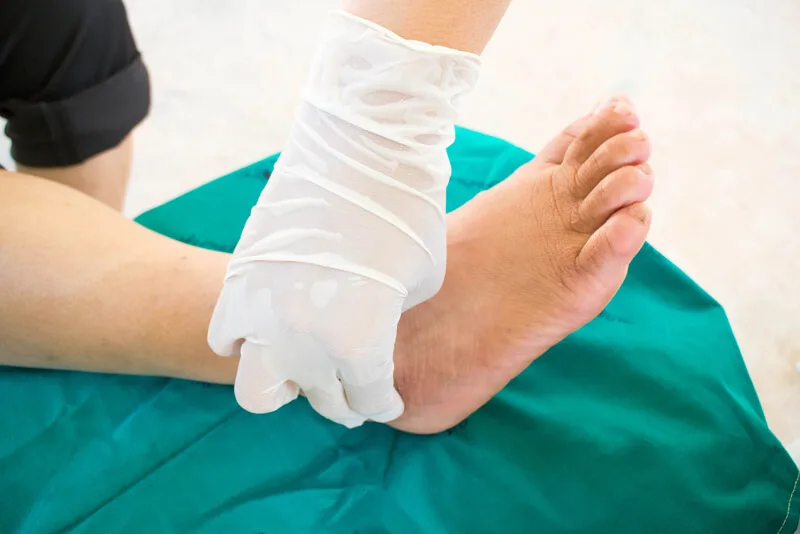Introduction: When Numbness and Tingling Aren’t Just “Annoying”
Ever get that pins-and-needles feeling in your feet—or maybe your legs feel like they’re buzzing or numb for no good reason? You’re not alone. At Accelerate Therapy & Performance, we hear this concern more often than you’d think. Neuropathy in the legs and feet isn’t just inconvenient—it can make walking, sleeping, and everyday life pretty frustrating.
Whether it started with a mild tingling or turned into full-blown pain, understanding what’s going on is the first step toward reclaiming your comfort and mobility. Let’s walk through everything you need to know about treatment for neuropathy in legs and feet, and why you don’t have to just “deal with it.”
Understanding Neuropathy: Why Are My Legs and Feet Acting Up?
Neuropathy is a condition that happens when your peripheral nerves—the ones outside your brain and spinal cord—get damaged. These nerves are responsible for sending signals between your body and brain, helping you feel touch, pressure, temperature, and pain.
When something goes wrong, those signals can get scrambled—or stop working altogether. That’s why you might feel burning, tingling, numbness, or sharp pain, especially in your legs and feet. This is called peripheral neuropathy, and it can affect just one nerve or many.
The reason neuropathy shows up in the legs and feet more than other areas? It’s because the longest nerves in your body run from your spine all the way down to your toes. That makes them more vulnerable to damage—especially if there’s pressure, poor circulation, or underlying medical conditions at play.
Common Causes of Neuropathy in the Legs and Feet
We know neuropathy is caused by nerve damage—but what causes that damage? The truth is, it’s often a combination of things. Here are some of the most common culprits:
1. Medical Conditions
- Diabetes is the #1 cause of neuropathy in the U.S. High blood sugar levels over time can damage the nerves, especially in the feet.
- Autoimmune diseases like lupus or rheumatoid arthritis can trigger inflammation that harms the nerves.
- Kidney or liver disease can lead to toxic buildup in the body, affecting nerves.
2. Injuries and Physical Trauma
- Falls, car accidents, or sports injuries can damage nerves in the lower body.
- Compression injuries like sciatica can cause pain to radiate down the leg and into the foot.
3. Nerve Entrapment and Structural Issues
- Conditions like tarsal tunnel syndrome (think carpal tunnel but in your ankle) can compress nerves and lead to symptoms.
- Spinal problems, such as herniated discs or spinal stenosis, can irritate nerves that serve the legs and feet.
4. Lifestyle Factors
- Alcohol abuse is a major risk factor. Long-term drinking damages nerves and affects vitamin absorption.
- Poor nutrition, especially lack of B vitamins, can weaken nerve health.
- Wearing ill-fitting shoes or standing for long hours on hard surfaces can add pressure to already-irritated nerves.
5. Medications and Toxic Exposure
- Certain chemotherapy drugs and medications for infections or seizures can have nerve-damaging side effects.
- Exposure to heavy metals or industrial toxins can also be a factor, especially in work environments.
Diagnosing Neuropathy: Is It Really Nerve Damage?
So how do you know if what you’re feeling is neuropathy—and not just a pinched nerve or sore feet? Diagnosis starts with awareness. Here are some things to look for:
Self-Assessment Questions
- Do you feel numbness or tingling that doesn’t go away?
- Do your feet feel like they’re on fire, even when they’re not?
- Is the pain worse at night or when you’re resting?
- Have you noticed muscle weakness or difficulty walking?
If any of these sound familiar, it’s time to see a professional. At Accelerate Therapy & Performance, our team takes a hands-on, comprehensive approach to diagnosing what’s really going on.
What to Expect in a Medical Evaluation
- Physical exam to test strength, balance, and reflexes.
- Nerve conduction studies or EMGs to measure how well signals travel through your nerves.
- Blood tests to look for underlying issues like diabetes, vitamin deficiencies, or inflammation.
Red Flags That Need Immediate Attention
- Sudden onset of severe symptoms.
- Loss of bladder or bowel control.
- Rapid muscle wasting or paralysis.
If you’re experiencing any of these, seek emergency care right away.
Treatment Options: How to Get Relief (and Keep It)
Good news: neuropathy isn’t always permanent. The earlier you address it, the better your chances of managing or even reversing the symptoms. Your treatment will depend on the root cause—but here are some of the most effective strategies we recommend:
1. Home Remedies for Relief
- Warm foot soaks with Epsom salt can relax muscles and stimulate circulation.
- Over-the-counter pain relievers, like ibuprofen, can reduce inflammation in the short term.
- Elevate your feet to reduce swelling and pressure on nerves.
2. Physical Therapy: Your Secret Weapon
This is where we come in. At Accelerate Therapy & Performance, we use a combination of techniques to:
- Improve nerve mobility and circulation
- Strengthen foot and ankle muscles to reduce strain
- Train your body in proper mechanics to relieve pressure on nerves
- Help you regain balance and coordination that may have been affected
And because no two bodies are the same, your treatment plan is always tailored to your needs and lifestyle.
Internal link: Learn more about our orthopedic therapy services.
3. Medical Interventions
- Prescription medications, such as anticonvulsants or antidepressants, can calm nerve pain.
- Topical treatments, like lidocaine patches or capsaicin cream, offer localized relief.
- In more severe cases, nerve blocks or surgery may be considered, especially if there’s a structural cause.
For long-term success, the focus should always be on treating the root cause, not just masking the symptoms.
Prevention Tips: Keep Neuropathy from Coming Back
You might not be able to control every factor, but there’s a lot you can do to protect your nerves—and your quality of life. Here’s how:
Be Kind to Your Body
- Eat a balanced diet rich in B vitamins, omega-3s, and antioxidants.
- Keep your blood sugar in check if you have diabetes.
- Stay hydrated and avoid excessive alcohol use.
Move Smart
- Incorporate low-impact exercises like walking, swimming, or cycling into your routine.
- Stretch your calves, hamstrings, and feet regularly to keep nerves mobile.
- Avoid repetitive pressure on your feet—take breaks, switch shoes, and add cushioning where you can.
Check Your Feet Often
- Especially if you have diabetes, inspect your feet daily for cuts, blisters, or changes in color.
- Wear comfortable, supportive footwear—and skip the high heels or flip-flops.
Don’t Ignore the Little Stuff
- Tingling and numbness aren’t just “quirky sensations.” They’re your body’s way of asking for help.
- Get annual checkups and bring up any new symptoms to your provider.
You Don’t Have to Live with This
If you’re tired of the burning, tingling, or “walking on clouds” feeling in your legs and feet, know this: there’s help. And you don’t need to figure it out alone.
At Accelerate Therapy & Performance, we specialize in creating customized, hands-on treatment plans that actually work—designed by real people who care about your recovery. Whether neuropathy is new to you or something you’ve struggled with for years, we’ll meet you where you are and help you get back to doing what you love, pain-free.
Book your consultation today and start your journey toward lasting relief. Your legs and feet will thank you.



